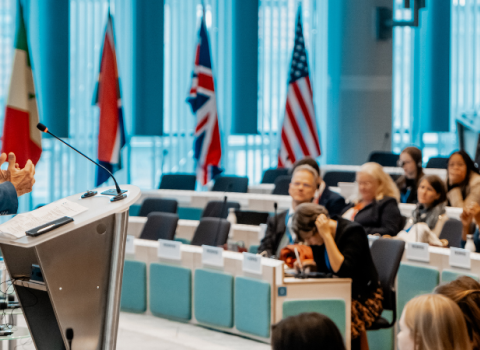American companies with huge investments in the UK are reviewing expansion plans and are prepared to move employees out of the country, amid concerns over post-Brexit access to the EU’s single market and a sharp break with EU regulations.
“Things will definitely get more cumbersome,” said Carlos Härtel, chief technology and innovation officer of GE Europe. Research and development carried out by the company relies on access to a steady stream of skilled workers from different EU member states and Brexit imperils this.
"An agreement on free mobility is very important,” said Härtel. “It would be very hard to relocate our systems out of the UK. We have 3,000 scientists who would be hard to move,” he told industry heads and policymakers at a meeting last Friday hosted by the American Chamber of Commerce to the EU.
Similarly, Erich Clementi, senior vice president of global markets and chairman of IBM Europe, cannot make sense of the UK’s push for a clean break – or “hard Brexit” – from Brussels. “You’re either at the table or you’re on the menu. We need to be at the table,” he said.
Clementi, and the wider digital sector, would like to see the retention of data passporting rights post-Brexit, so that data centres can continue to hold information on EU and UK nationals. IBM recently committed to build four new data centres in the UK. “If EU data cannot be stored there, it has huge consequences for us,” he said.
Sajid Hussein, general counsel for Bank of America Merrill Lynch, said that before the referendum last year Brexit contingency plans were left sitting in a drawer. “Nobody thought we’d need them.” Now, they are out of the drawer and being put into action.
Staff relocations are inevitable. “There may be things we can’t do from London anymore. Inevitably we’ll have to do these activities in our EU entities,” said Hussein.
A study presented at the meeting showed what is at stake: American investment in the UK in 2015, worth a record £487 billion, was mainly down to the country’s EU membership and access to the single market.
Most significantly, the US has a bigger interest in seeing the UK negotiating favourable terms for Brexit than in signing a new bilateral free trade deal, according to the study. Both the US and the UK have more to gain from achieving some agreement with the EU than simply with each other,” the study says.
Joe Quinlan, senior fellow with the Center for Transatlantic Relations at Johns Hopkins University, and one of the authors of the study, says reality is about to catch up with Britain as it heads for a hard Brexit. The British economy has shown resilience since last summer's vote but, “Don’t be fooled that everything is okay. There’s a lot left to drop,” he said.
These warnings follow similar statements made by the Japanese business community.
Stay close to EU rules
Executives are not only adamant that leaving the single market would be a costly mistake for the UK, they also believe the unravelling of EU red tape and regulations promised by the UK government is of questionable benefit.
“The closer the UK stays to data protection rules, the easier our life is going to be,” said Clementi.
Fiona Dawson, global president of Mars foods, agreed. “UK must not get out of step with the EU regulatory environment,” she said.
Brexit is the “most business-critical issue” her company faces today. The confectionary giant has €4.4 billion invested in the EU, counting its factories and 18,000-strong workforce. The prospect of post-Brexit tariffs, and a hard border between North Ireland and the Republic of Ireland, worries the company’s executives, who see a resulting increase in the costs of doing business.
Possible restrictions on importing foreign labour is a concern for GE Europe, which employs 100,000 people in the bloc, mostly in its turbine factories in Germany, France and Switzerland.
“A lot of what we do is assembly of components made by companies in other countries. Our supply chain is across Europe,” said Härtel. “Any barrier is a hindrance which leads to lower growth – that’s the fundamental issue. I don’t see us re-modelling our supply chain overnight or over the mid-term. But you do think twice about hiring suppliers from the UK,” he said.
There may be general Brexit gloom, but some big US companies have expressed optimism about the UK’s future. Apple's chief executive Tim Cook said the UK will be “just fine” outside the EU, during a visit to the country last month. The iPhone maker is building a new headquarters in South London.
Likewise Facebook has announced plans to hire another 500 employees in the UK, a headcount boost of 50 per cent, as it prepares to open new London office this year.
Cool heads
Despite the British government’s threat that it is prepared to walk away from Brussels with no deal in two years, the deadline for wrapping up talks, Clementi believes self-interest will prevail. “The UK exports more digital services into the EU than anywhere else,” he said.
Härtel’s pleaded for negotiators to refrain from the pumped-up rhetoric which has surfaced on both sides occasionally in recent months. “I would strongly advise against fighting fire with fire. The rest of the world watching on is likely to be puzzled and appalled,” he said.





 A unique international forum for public research organisations and companies to connect their external engagement with strategic interests around their R&D system.
A unique international forum for public research organisations and companies to connect their external engagement with strategic interests around their R&D system.